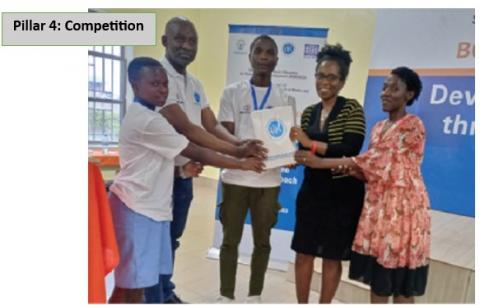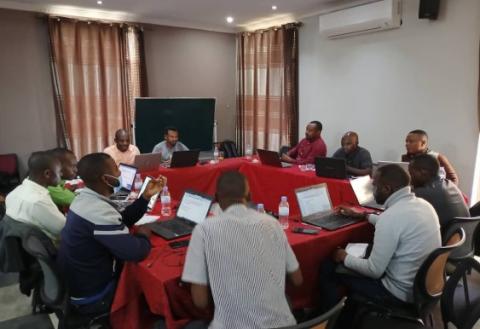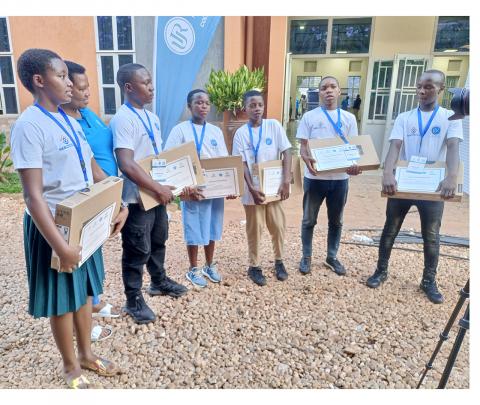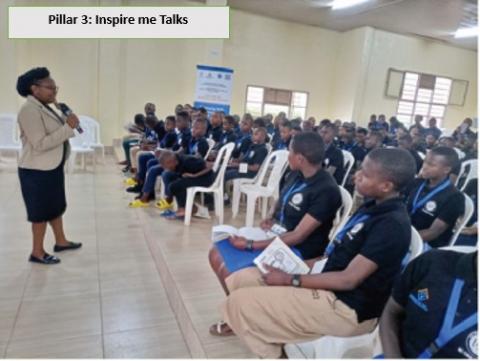Weekend training sessions of the CPD-ITMS Cohort 2024 for STEM teachers is underway
In a significant move to align with Rwanda’s Competence-Based Curriculum (CBC) and the need for innovative teaching methods, the University of Rwanda-College of Education (UR-CE), in partnership with the Rwanda Basic Education Board (REB), has launched the final cohort of the Continuous Professional Development on Innovative Teaching Mathematics and Science (CPD-ITMS) program. Funded by the World Bank as part of the Rwanda Quality Basic Education for Human Capital Development (RQBEHCD) project, Sub-component 1.2, this initiative aims to transform STEM education in Rwanda by equipping teachers with essential digital and pedagogical skills.
Building on the achievements of earlier cohorts, which certified 2,506 teachers by February 2024, this year’s program has engaged approximately 640 STEM educators from Primary 4 to Secondary 3 across 14 training centers. The training kicked off with an induction session on October 12-13, followed by intensive weekend sessions centered on "E-Learning and ICT Integration in Teaching and Learning Maths and Science."
During the first module, which concluded on November 2-3, educators gained both theoretical knowledge and practical experience with digital tools like GeoGebra, PhET simulations, and Google Classroom, aimed at making math and science concepts more accessible and engaging for students.
Participants have expressed enthusiasm about the practical applications of their new skills. Habyarimana Anastase, a mathematics teacher at GS Kibara in Gasabo District, stated, "Before the training, I struggled to find adequate visual aids for teaching fractions in P5 and P6. Now, I’ve learned how to refine my methodology, which will significantly improve my teaching." His reflections highlight the training’s focus on equipping teachers with effective strategies to boost student understanding and engagement in STEM subjects.
Nyirimbabazi Naclet Patience, a biology teacher at GS Shaba in Nyamagabe District, shared her optimistic outlook : "This training will positively impact my teaching by motivating students to enjoy Biology and school overall, which may reduce dropout rates. With e-resources like videos projected in class, students can revise material at home using their smartphones. Even if I’m not present, they can revisit the lessons."
Mukampire Aline, a physics teacher from GS Kabuga K in Ruhango District, expressed her excitement about the transformation brought by ICT integration : “This is changing how we teach. My students are more engaged and can see real-world applications of science by using tools like PhET.”
The program’s commitment to inclusive education is also noteworthy. Nyakayiro Ivan Christian from GS KOTANA in Huye District expressed his gratitude : "The inclusive teaching strategies I learned empower me to make each lesson accessible to all students, regardless of their learning needs."
Through a blend of online modules and in-person sessions, the CPD-ITMS program fosters continuous peer support via interactive quizzes, simulations, and discussion forums. Teachers are already witnessing remarkable transformations in their classrooms. Marie Grace Mukamana, a chemistry teacher at GS Bumbogo in Gasabo District, remarked, “Before this training, my ICT skills were limited to using computers and projectors. Now, I confidently use digital tools like interactive simulations, which have turned my classroom into an engaging space for science learning.” She added, “Last week, I taught my Senior 2 students about water pollution using an interactive simulation video. Their reaction was amazing—engaged, motivated, and eager to learn. This training on E-Learning and ICT integration is truly transformative.”
Musabimana Devotha, a Mathematics Teacher at GS Matyazo in Huye District, agreed with these sentiments, stating, “Online tools like videos and quizzes are enhancing my understanding of ICT for teaching in a simple and accessible way. Tools like Plickers will also make it easy for teachers to assess students and record their marks efficiently.”
The RQBEHCD project, Sub-component 1.2, aims to modernize instructional tools and enhance the knowledge and pedagogical practices of Mathematics and Science teachers in upper primary through lower secondary. This initiative emphasizes four key areas : increasing teacher content knowledge, improving classroom teaching practices, ensuring the availability of critical teaching materials and ICT tools, and providing continuous support to teachers. Ultimately, the main beneficiaries of the project are students and teachers in upper primary and lower secondary education, ensuring a brighter future for STEM education in Rwanda.






